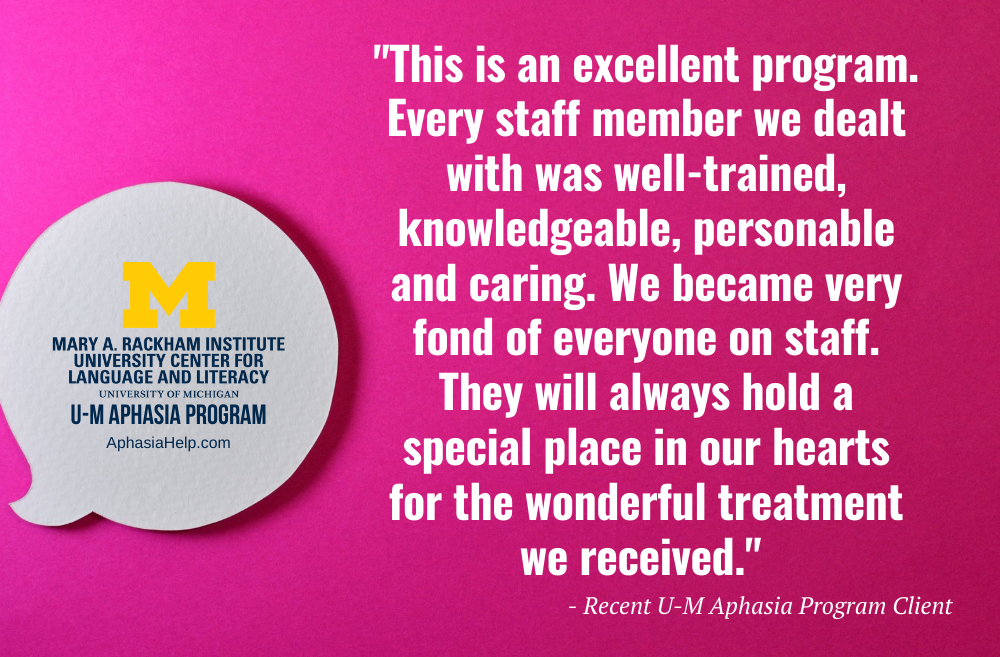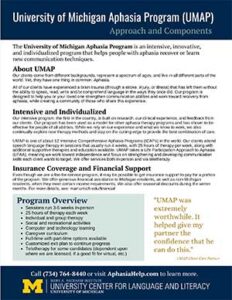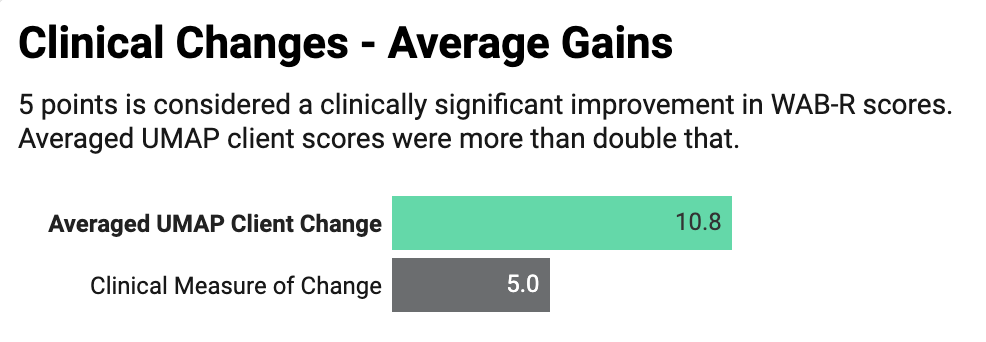Welcome, Fellow Speech-Language Professional!
Thank you for taking the time to get to know the
U-M Aphasia Program better — and what it is we can do for you and your clients.
We have heard from SLPs who often feel frustrated or overwhelmed with figuring out what to do next with clients with aphasia who have plateaued, who are limited to a few sessions per week because of case load or insurance limits, or who would benefit from or need more frequent and intensive therapy.
Does that sound familiar? Have you found yourself in that scenario? We can help!
Our program is perfect for people with aphasia who may have slowed their progress or who might require a more intensive approach to speech and language therapy for recovery. We offer year-round, intensive in-person sessions at our Michigan office, as well as teletherapy (in states where we are licensed).
Learn More: Scroll below to see program components, client outcomes, and more.
Ready to make a client referral to UMAP? Click here to go to the referral and contact page.
When you send your clients to the U-M Aphasia Program, rest assured they are in great hands!

NEW! Aphasia Readers Series Book 1: A Day in the Life
If you are interested in claiming a complimentary copy of the new Aphasia Readers Series Book 1: A Day in the Life, click here to complete the form. We have limited copies available (the form will alert you if all copies have been claimed).
About the Book
For people with aphasia, the book options for practicing and building reading skills are lacking. They are often written like children's books or unrelated to daily life with aphasia. The Aphasia Readers series provides a multi-faceted-yet-simple approach for adults with aphasia to practice reading aloud and improving speech.
The books feature fully illustrated segments with interactive reading, speaking and writing exercises that relate to everyday life, like ordering a coffee or visiting a park.
The Aphasia Readers series was created by husband-and-wife team, Ryan and Anna Teal. Ryan had a massive stroke at 34, which left him with aphasia and apraxia. Anna is his primary care partner. Throughout recovery, the repetition of reading aloud is a tried-and-true form of speech practice with promising results — but the Teals noted a lack of books that are relevant and engaging for people with aphasia.
The Teals worked on this first book for more than a year, working in close collaboration with the U-M Aphasia Program and garnering input from other top neurological teams.
Available for Purchase
The spiral bound books are available now, retailing for $34.99 plus shipping. A portion of the proceeds from each book set goes back into supporting aphasia awareness and helps others pay for much-needed intensive speech therapy.
UMAP Overview to Share with Clients: PDF
If you have a client who might be interested in the U-M Aphasia Program (UMAP), you can direct them to our public UMAP website: aphasiahelp.com or download this PDF to share. You can download the PDF, print it, or share it via the link (click the link above, copy the URL in your browser bar and paste it in an email or text message).
you have a client who might be interested in the U-M Aphasia Program (UMAP), you can direct them to our public UMAP website: aphasiahelp.com or download this PDF to share. You can download the PDF, print it, or share it via the link (click the link above, copy the URL in your browser bar and paste it in an email or text message).
Sign Up for UMAP Email News
U-M Aphasia Program Components and Outcomes
But how do we know it works? Is it worth the money? How do you know if you should recommend the U-M Aphasia Program to a client or caregiver?
UMAP Outcomes and Progress

The information here is representative of an average full-time intensive UMAP experience. We used several data points, including the Western Aphasia Battery - Revised (WAB-R) scores as benchmarks.
While the numbers are compelling, they don't tell the whole story. For example, UMAP clients often show gains in confidence and independence, key parts of recovery that aren't necessarily reflected on standardized assessments.
Outcomes can also vary based on type and severity of aphasia.

UMAP Client Progress More than One Year Post-Aphasia
Even clients who have had aphasia for more than one year showed significant progress on the WAB-R after one full, in-person UMAP session, based on pre- and post-testing.

100% of Clients and Care Partners Would Recommend UMAP
When asked if they would recommend the U-M Aphasia Program to others with aphasia, 100% of clients and care partners said yes. More than 97% said they would "highly recommend" the program.
More Client Data
If you are interested in learning more about our client data, see: UMAP Client Outcomes Data
Want to Learn More About Aphasia in General or UMAP Specifically?
We would love to answer your questions or provide more information!
We are also happy to provide in-service workshops or presentations about aphasia or the intensive approach to treatment.
Please call us at (734) 764-8440 or fill out the contact form here to get the conversation started.
